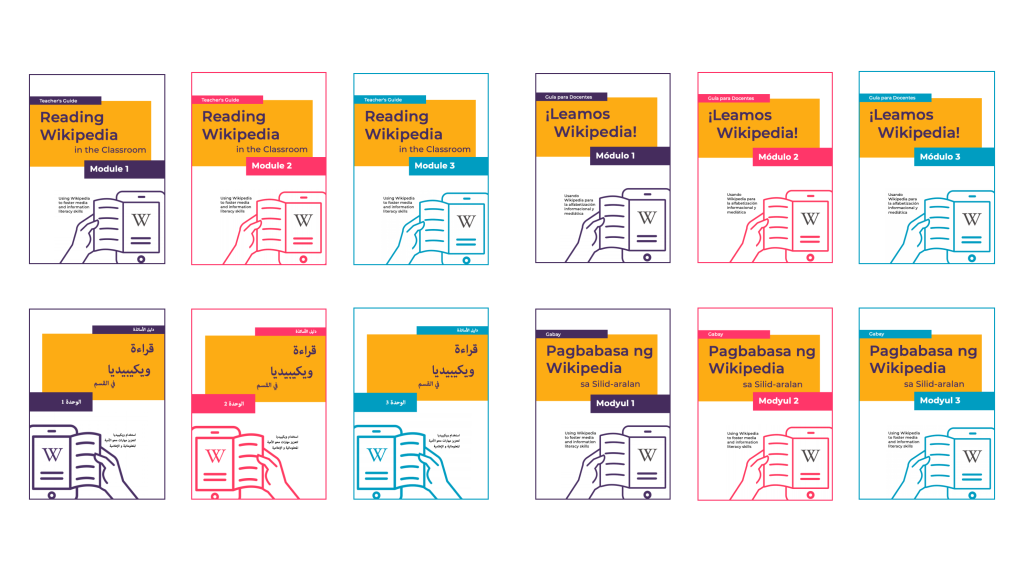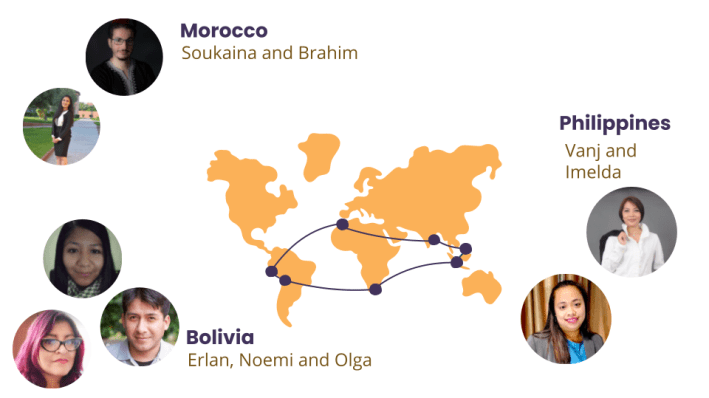The Education Team is happy to announce that the resources of the Reading Wikipedia in the Classroom program are now available on Wikimedia Commons! You will find booklets for teachers and students introducing Wikipedia and the Media and Information Literacy framework, and the three modules of the Teacher’s Guide which were designed to be easily adaptable for different contexts and languages. You can find versions of these resources in English, Spanish, Arabic, and Tagalog.

What can you do with these resources? You can share them with teachers for self-study purposes, you can translate them and adapt them to your own local context, or you can grab the content that is more relevant for you and remix them! These resources will help educators to better equip their students with vital media and information literacy skills for the 21st century, including understanding how information is produced, how to access and evaluate content online, and how to understand biases and knowledge gaps.
What is Reading Wikipedia in the Classroom?
In 2020, the Education team at the Wikimedia Foundation launched the pilot program “Reading Wikipedia in the Classroom”. Hundreds of secondary school teachers from Morocco, Bolivia and the Philippines participated in this online training opportunity. The program set out to transform the perspectives that teachers have about Wikipedia as a source of information by providing an opportunity to explore the encyclopedia, understand its behind-the-scenes processes and policies, and leverage its use to foster media and information literacy skills. We worked with local coordinators from Wikimedia affiliates in the three pilot countries to offer a high-quality and meaningful professional development opportunity. Together we produced, contextualized, and translated educational resources and synchronous training sessions for a curriculum aligned with UNESCO’s Media and Information Literacy (MIL) framework. This resulted in a Teacher’s Guide composed of three modules that present Wikipedia under the components of the MIL framework. These modules also incorporate topics of interest for teachers regarding the digital space, youth, and project-based learning – which we learned about through a needs assessment conducted before the start of the program. Not only that but it also includes articles provided by Marc Miquel from the Wikipedia Diversity Observatory, The Wikipedia Library team, and Whose Knowledge? that allowed teachers to reflect on the importance of cultural representation online, the challenges in accessing sources of information, and building community knowledge responsibly.

Changing how teachers view and use Wikipedia
More than 7,000 teachers engaged with the content of the program by accessing the resources and joining our live training sessions. 540 teachers participated in the full training program, completing assignments and actively reporting on their learnings. After the 9-weeks of the program, more than 200 teachers earned a certificate – this means they completed all the required assignments in the three modules, they attended the synchronous training sessions, and they submitted a final assignment with a proposed lesson plan that integrates the use of Wikipedia in their classroom.
Through a set of surveys and in-depth interviews conducted by our local coordinators we learned that teachers had a positive experience in the training program because it provided them with professional and continuous support in an online co-learning environment. This allowed teachers to value Wikipedia as a pedagogical tool for developing MIL skills. The initial evaluation data shows us that by the end of the program 81% of participants felt confident in applying their new knowledge and skills about Wikipedia in the next school year. Moreover, their positive views of Wikipedia as a valuable source of information increased after the experience.
What’s Next?
In the coming weeks, the Education team at the Wikimedia Foundation will be sharing the full program report and announcing opportunities for scaling the program in our next fiscal year. This includes a training of trainers and funding opportunities for other Wikimedia communities to implement the program in their own localities. Additionally, we will be sharing more assets developed for this program, including pre and post program surveys, localization guides, and resources to conduct synchronous training sessions.
We hope that you find these resources helpful! If you would like to get in touch with the Education team about this training program, please send us a message at education@wikimedia.org
Melissa Guadalupe Huertas is a Program Officer, Education at the Wikimedia Foundation.
Nichole Saad is the Senior Manager for Education at the Wikimedia Foundation.

Can you help us translate this article?
In order for this article to reach as many people as possible we would like your help. Can you translate this article to get the message out?
Start translation